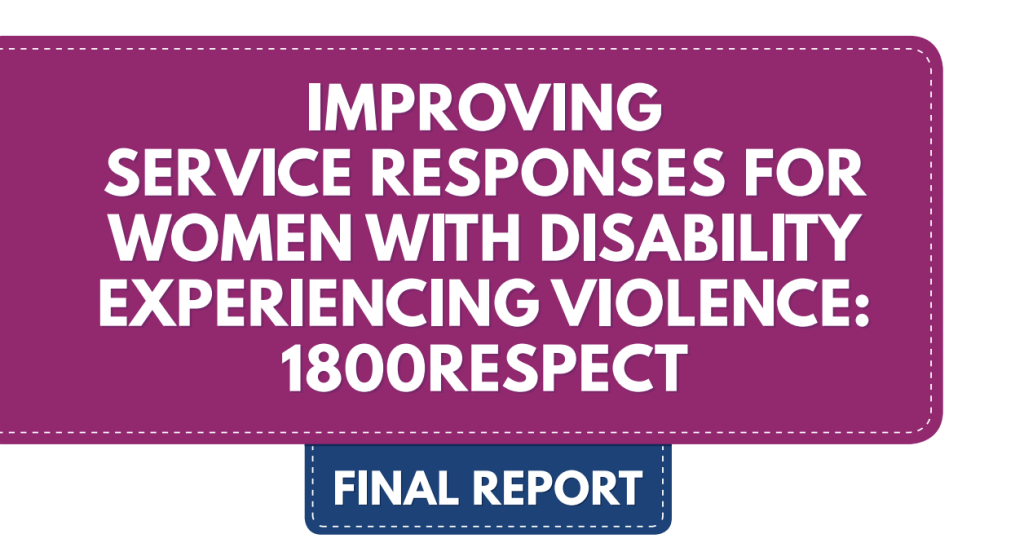Between January and August 2016 Women with Disabilities Australia (WWDA) conducted a six-month project to assess the adequacy and accessibility of 1800RESPECT – the national sexual assault, domestic and family violence counselling service for people living in Australia. In consultation with over 100 women and girls with disability from around Australia, the 1800RESPECT: Improving Service Responses for Women with Disability Experiencing Violence project identified forty-three recommendations for making 1800RESPECT more inclusive of, and responsive to, the needs of women and girls experiencing all forms of violence and abuse.
WWDA is pleased to release our extensive report on the project, which is now available for download on the WWDA website and via the following links:
The 1800RESPECT service is one of the Australian Government’s key national initiatives to prevent violence against women and their children. It was set up in 2010 under the first action plan of the 12-year National Plan to Reduce Violence Against Women and their Children 2010-2022, and was established to provide a 24-hour, 7 days a week confidential telephone and online counselling, information and referral service to anyone whose life has been impacted by sexual assault, domestic or family violence. Services are provided through telephone, online interactive counselling, a website, social media platforms, and an application known as the ‘Daisy’ app. 1800 RESPECT also provides a support service for front-line workers and other professionals who are working with people affected by violence. The 1800RESPECT service is currently provided by Medibank Health Solutions Pty Ltd on behalf of the Australian Government Department of Social Services.
WWDA received six-month contract funding from Medibank Health Solutions Telehealth Pty Ltd (MHS) to evaluate the current 1800RESPECT service and make recommendations regarding accessibility to women and girls with disability. In keeping with WWDA’s human rights based approach, the project prioritised, promoted and facilitated greater participation of women with disability in policy, program and service reform in the gendered violence prevention effort. The 1800RESPECT: Improving Service Responses for Women with Disability Experiencing Violence project focused on four key components:
- Evaluating the inclusiveness of the 1800 RESPECT service model and scope;
- Evaluating the usability and accessibility of the 1800 RESPECT website, including content and information and resource materials required for women and girls with disability;
- Evaluating the accessibility and responsiveness of the 1800 RESPECT counselling services for women with disability;
- Assessing general awareness of the 1800 RESPECT service amongst women with disability.

When I contacted 1800RESPECT I wanted them to give me advice and tell me where I could get real help. I tried to explain to them that my abusive husband says that I will lose the kids if I report him to the police. He says that because I have a disability, they will give him the kids. The 1800RESPECT lady wasn’t interested in talking with me. She told me to contact WWDA or Lifeline.
Consultation Participant
Recognising that the active, informed, and meaningful participation of women and girls with disability is integral to addressing all forms of violence against them, all aspects of the project were grounded in, and informed by the voices, experiences and expertise of women and girls with disability. More than 100 women and girls with disability participated in and actively contributed to the project, through a range of engagement and consultation mechanisms. These included co-design workshops, surveys, face to face individual and group interviews, use of social media platforms, telephone interviews, focus groups, email based discussions, and written submissions to WWDA. The knowledge and information provided by women with disability engaged in this project, built on extensive evidence gathered by WWDA over the past 5 five years into the adequacy of the 1800RESPECT service for women and girls with disability experiencing and at risk of violence.

We are not included in this service. There is a lack of understanding about the sorts of violence that are perpetrated against us.
Survey Response
WWDA’s extensive report on the project provides:
- Information on the project framework, including goals, objectives, scope and focus;
- An overview of the 1800 RESPECT service and the key policy and program context for the evaluation project;
- An analysis of Australia’s international human rights obligations in preventing and responding to violence against women and girls with disability;
- An exploration of how the 1800 RESPECT service has, to date, conceptualised violence against women;
- Evidence on women and girls with disability’s experiences of violence, including structural and institutional forms of violence;
- A snapshot of the information provided by women with disability throughout the project in regard to use of technology and online services;
- Detailed findings from consultations with women and girls with disability in regard to the current 1800 RESPECT service.
There are many women, including women with disabilities, who find it too hard to stay away, an/or leave for good. Sometimes it can be really hard. Being able to read or hear about other women’s experiences – especially their life after they escaped – would be really useful to other women.
Consultation Participant
WWDA made forty-three recommendations in regard to improving the 1800 RESPECT service for women and girls with disability across eight key areas:
- Future Directions: Whole of Government
- Service Conceptualisation, Model, Scope and Role
- Marketing and Communications
- Inclusive and Accessible Service Design
- Service Quality, Monitoring and Evaluation
- Referral and Response
- Data Collection and Use
- Collaboration and Innovation
Access the full report and detailed recommendations:
- 1800RESPECT: Improving Service Responses for Women with Disability Experiencing Violence (DOC)
- 1800RESPECT: Improving Service Responses for Women with Disability Experiencing Violence (PDF)
This report has been provided in full to the Australian Government and we look forward to their response moving forward in regard to creating a more inclusive and responsive 1800RESPECT service.

